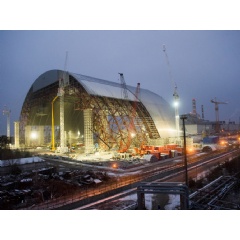Chernobyl New Safe Confinement Named One of the Most Influential Projects of the Last 50 Years
Project Management Institute recognizes international team, including Bechtel

The international, 22-year effort to cover and seal off the damaged Chernobyl nuclear plant has been recognized as one of the 50 most influential projects of the past 50 years by the Project Management Institute, the global body for project management standards, certifications, and education.
The award came Monday at the organization’s 50th anniversary celebration in Philadelphia.
“This recognition reflects the incredible progress we have made in the project management profession and demonstrates how the fabric of our world has been shaped, and continues to be shaped, by the hard work of bringing ideas to life,” said Sunil Prashara, President and CEO of Project Management Institute. “This list demonstrates PMI’s vision of how excellence in project execution will be critical in meeting the challenges and opportunities of tomorrow.”
“Completing the New Safe Confinement took an all-in effort by the whole team,” said Bechtel’s project manager, Oscar “Mac” McNeil. “It required international cooperation and ingenuity to overcome the challenges presented by radiation and the environment around the plant, not to mention the Ukrainian winters.”
Balthasar Lindauer, EBRD director of Nuclear Safety, said: “We are honored to receive this prestigious award. It is recognition of what the community of donors together with Ukraine was able to achieve in this unique display of international solidarity.”
EBRD is the only international financial institution with expertise in nuclear decommissioning and more than 30 years of expertise in managing donor-funded projects.
Bechtel led the consortium that performed an original design of the sports-stadium-sized arch that was slid over the reactor in 2016. NOVARKA, a joint venture of the French firms VINCI Construction and Bouygues Travaux Publics, performed the design and construction. The European Bank for Reconstruction and Development financed the project along with more than 40 donor nations.
Today, Bechtel is the project management unit, under contract to State Specialized Enterprise – Chernobyl Nuclear Power Plant. Bechtel ensures that engineering and construction meet the plant owner’s strict quality requirements.
A long-term solution
Chernobyl’s reactor No. 4 was destroyed in a nuclear accident in 1986. A concrete covering, hastily built over the reactor, developed cracks and became unstable, prompting the need for a longer-term solution. That solution took shape during the 1990s and early 2000s.
At a cost of $1.6 billion, the giant structure is the most prominent element of the Shelter Implementation Plan for Chernobyl, which involved more than 300 projects and activities. The $2.3 billion program is financed by the Chernobyl Shelter Fund. EBRD manages the fund and is its largest contributor, providing $785 million to support Chernobyl projects.
The arch seals out wind, snow, and rain and confines radioactivity inside. It:
- weighs 36,000 tons
- measures 345 feet tall, 540 feet long, and spans 840 feet
- is made of more than 80 elements held together with 600,000 bolts.
NOVARKA assembled the arch away from the damaged reactor and then slid it into its final place on two massive rails.
The project was handed over to the Ukrainian authorities in July of 2019. The confinement is now in place, and specialized, remote-operated equipment is commissioned and ready for the day when the reactor building can be demolished. That could be 100 years from now, after radioactivity has decayed to acceptable levels.
Learn more:
- The Story of Chernobyl’s New Safe Confinement
- Time lapse video of the arch being slid into place
- Photos and the latest project updates
About EBRD:
The European Bank for Reconstruction and Development (EBRD) was established in 1991 and today operates in 38 economies on three continents ranging from Morocco to Mongolia and from Estonia and Egypt. The Bank’s mandate is to promote the private sector and support sustainable development. To date, the Bank has invested some €140 billion in more than 5,500 projects in all sectors of the economy. EBRD is also managing seven donor-financed funds for the decommissioning of Soviet-era nuclear facilities and equipment as well as environmental remediation.
( Press Release Image: https://photos.webwire.com/prmedia/5/248311/248311-1.jpg )
WebWireID248311
This news content was configured by WebWire editorial staff. Linking is permitted.
News Release Distribution and Press Release Distribution Services Provided by WebWire.
